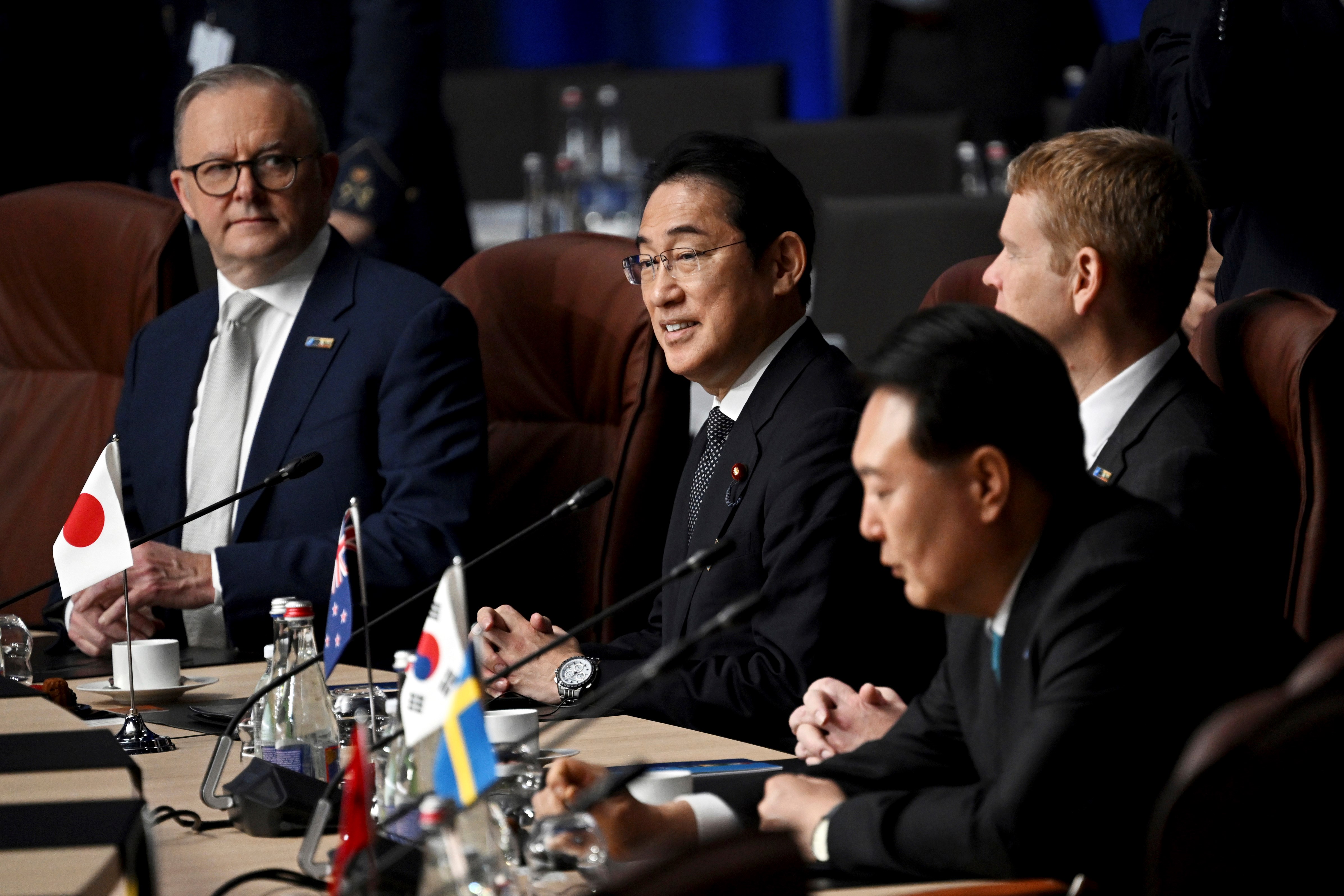South Korea urges AP4 NATO allies in response to DPRK missile launch
South Korean President Yoon Suk-yeol tells AP4 NATO allies that there needs to be a collective security framework in place in response to the ballistic missile launches from the Democratic People's Republic of Korea.
-

Australia's Prime Minister Anthony Albanese, Japan's Prime Minister Fumio Kishida, New Zealand's Prime Minister Chris Hipkins, and South Korean President Yoon Suk Yeol, attend a meeting of the North Atlantic Council with Partner Nations at a NATO summit in Vilnius, Lithuania, Wednesday, July 12, 2023. (AP)
Following the Democratic People's Republic of Korea's recent missile launch, South Korean President Yoon Suk-yeol encouraged the country's three NATO allies in the Asia-Pacific (AP4), Australia, Japan, and New Zealand, to develop a collective security framework.
A ballistic missile fired by the DPRK earlier in the day landed 155 miles off the coast of Japan's Okushiri Island, which is beyond the country's Exclusive Economic Zone (EZZ).
In a meeting on the sideline of the NATO summit in Vilnius Yoon, according to Yonhap, said "I believe we, the AP4, should band together with NATO to establish a strong collective security posture. We will have to use this as an opportunity to enhance our cooperation framework with NATO and take a leading role in regional security in the Indo-Pacific region."
According to reports, Yoon's initiative was supported by Japanese Prime Minister Fumio Kishida, who described the DPRK's launch as a threat to global peace and stability. Anthony Albanese of Australia denounced the launch as a violation of UN resolutions and reaffirmed Canberra's support for Seoul.
Yoon had earlier called a special meeting of the National Security Council and allegedly threatened to hold the DPRK accountable.
DPRK launches 'unidentified ballistic missile': Seoul
The DPRK has fired a ballistic missile, Seoul's military said Wednesday, two days after US spy planes violated its airspace. "North Korea fired an unidentified ballistic missile into the East Sea," the Joint Chiefs of Staff said, in reference to the body of water also known as the Sea of Japan.
The military has not yet released specific details about the launch, as an official analysis is still ongoing. However, initial reports from defense insiders suggest that the missile flew for approximately 74 minutes, reaching an altitude of 6,000 kilometers and covering a range of 1,000 kilometers.
In response to the launch, Japanese officials have issued a statement instructing aircraft and ships to avoid any potential debris and to inform the Japan Coast Guard of any findings.
Japanese Chief Cabinet Secretary Hirokazu Matsuno has condemned the launch, describing it as "unacceptable", and calling it a threat to the peace and security of Japan, the region, and the international community.
Read more: DPRK threatens to down US reconnaissance aircraft violating airspace
Matsuno claimed that such ballistic missile launches violate relevant United Nations Security Council resolutions and stated that a strong protest has been lodged through the Japanese embassy in Beijing.
On July 10, the DPRK accused the United States of repeatedly violating its Exclusive Economic Zone with a military spy plane. The deputy head of the Central Committee of the Workers' Party of Korea, Kim Yo Jong, stated that the US plane entered the DPRK's EEZ eight times in a single day.
The intrusions reportedly occurred off the east coast of the Korean Peninsula, specifically near Thongchon in Kangwon Province and Uljin in North Gyeongsang Province. Kim Yo Jong stated that the DPRK would not respond directly to US reconnaissance activities outside its EEZ, but warned of "decisive action" if the US military crosses its maritime military demarcation line.
Read more: DPRK denounces US decision to supply Ukraine with cluster munitions

 3 Min Read
3 Min Read








